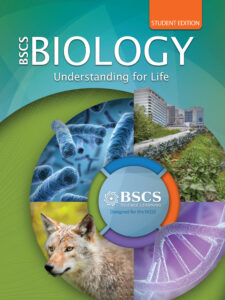Introducing the Next Generation of BSCS Instructional Materials
February 8, 2022
Dr. Lindsey Mohan, BSCS Director of Instructional Materials Development, shares insight on two major program launches on the horizon.
BSCS was founded more than 60 years ago to design and develop innovative instructional materials. We continue with that work today. Since our founding, BSCS materials have been designed to support student curiosity and student-driven investigation. We believe that the most successful learning experiences are ones in which students fully engage in the inquiry process and find value in what they are learning about.
The release of the Next Generation Science Standards (NGSS) gave us an opportunity to reimagine what inquiry learning could look like at the nexus of disciplinary core ideas, science and engineering practices, and crosscutting concepts. For the past few years, our teams have been collaborating with other curriculum designers, teachers, and experts to produce two new instructional materials programs that not only embody the NGSS but also build upon research-based approaches to supporting equitable learning in classrooms.
We are excited to share BSCS Biology: Understanding for Life, our new, full-year high school biology program, and OpenSciEd Middle School, a three-year, open-access middle school science program. These programs are designed to support a classroom culture that elevates students’ voices, ideas, and experiences in all their forms. They contain learning experiences that aim to empower students to ask scientific questions, pursue those questions, and contribute as valued members of a classroom community. Our intention is for these programs to support larger efforts to transform the teaching and learning in science.
At the end of February 2022, the development work on these brand new programs will be completed. We are excited to enter a new phase in which our efforts will focus on sharing and disseminating these programs as widely as possible.
BSCS Biology: Understanding for Life

Jean Flanagan, a BSCS Science Educator who led the materials development, shared, “As a development team, we identified areas where key science concepts overlap with the types of decisions that students might have agency in. We then designed activities that would help students and teachers see these connections and work together to figure out how they might take action in their local context. Ultimately, it was important to us to develop a program that prepares all students from all backgrounds for life in the 21st century.”
The BSCS Biology program is also the first of many programs to come that is designed using BSCS’s new instructional model: Anchored Inquiry Learning. In this approach to instruction, student learning is anchored in the context of explaining phenomena and/or designing solutions to problems. Learning is driven by students’ questions as they conduct investigations to develop more-sophisticated models and explanations over time. Implementation of Anchored Inquiry Learning is supported by a set of routines that are used in different combinations in different types of lessons. The routines serve as scaffolds that allow students to engage in increasingly sophisticated inquiry over time.
“Teachers and district leaders are excited about the collaborative classroom culture emerging from Anchored Inquiry Learning,” shared Cindy Gay, BSCS Science Educator and co-lead on the project. “They report high engagement because students are grappling with issues that matter to them, their families, and their communities. Teachers have noted their students sharing their learning with their families and making connections to issues beyond the course. Further, built-in supports contribute to teachers’ professional learning in both NGSS content and pedagogy.”
OpenSciEd Middle School

For the past four years, BSCS has been at the center of a monumental effort. In 2018, a group of national funders invited us to take the lead in a consortium of five organizations and dozens of individuals to produce a high-quality, open access science program for the NGSS that could be implemented at a national scale. It’s called the OpenSciEd Middle School program. It required significant investment, time, and collaboration across funders, educational designers and researchers, and state partners–along with a brave group of classroom teachers and their students willing to take a chance on a very new way of teaching and learning science. Our role was to lead the design and development of the instructional materials and accompanying professional development programs.
Audrey Mohan, a BSCS Senior Research Scientist who led the OpenSciEd materials development team, shared, “Our vision was to create accessible, engaging, and coherent units for students and their teachers. Throughout the development, we took time to survey hundreds of field-test teachers and students to help design and revise these units. By bringing all of these voices and experiences to the table, we were able to accomplish this ambitious goal of designing a high-quality, three-year program, free to anyone.”
OpenSciEd Middle School now provides 18 middle school units that have been recognized through peer review as “high quality NGSS design” units. These materials are completely free to educators and schools around the world.